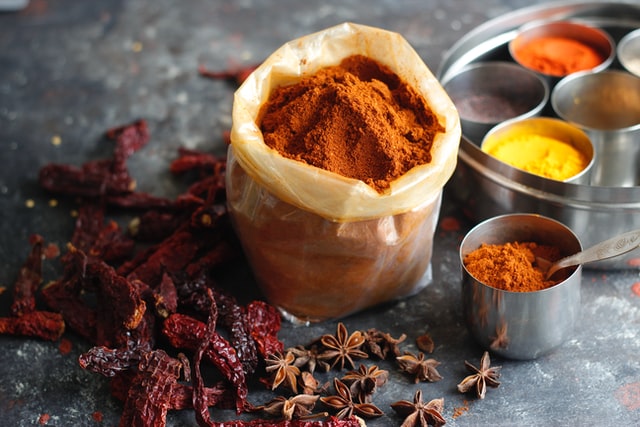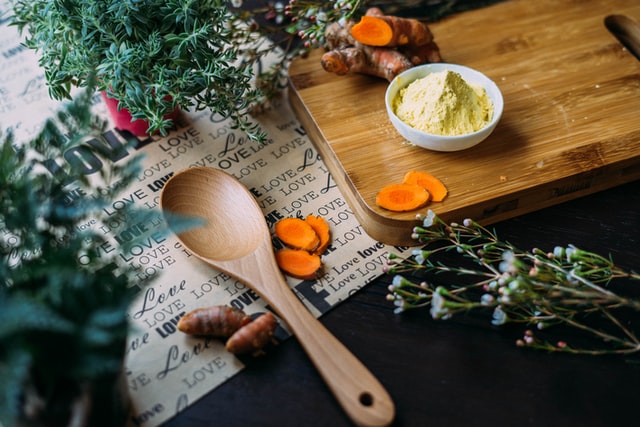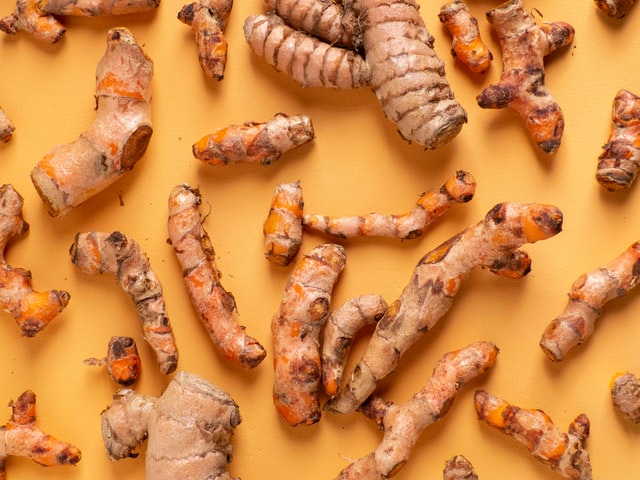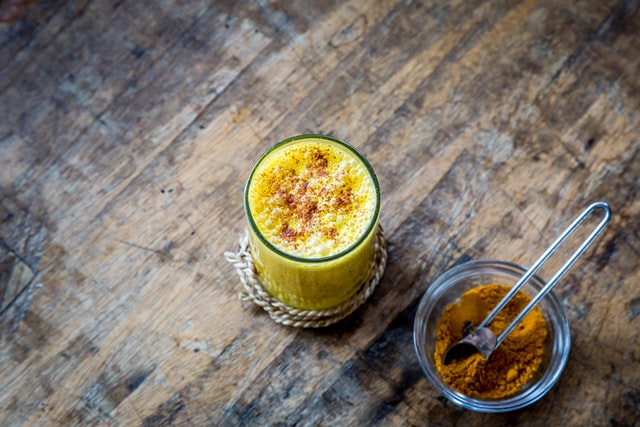If you’ll excuse the pun, turmeric really is the “golden” child of the herb world! It’s a beautiful, flowering plant from Southeast Asia with vibrantly coloured rhizome (underground stem). It has a long history in India as a culinary herb along with other herbs and spices, but it is also a phenomenal superfood for medicinal effects as well. Turmeric is one of those plants that really “feeds” into Hippocrates’ suggestion to let food be thy medicine and to let medicine be thy food. Curcuma longa is turmeric’s Latin name, which gives rise to some of the best studied medicinal active within it, the curcuminoids. These are not the only components within it that have a positive effect on our health. There are also turmerones, flavonoids, various organic acids, and essential oils to name a few. The synergy between all of these molecules results in a powerhouse of support for our entire body!1

Health Always Starts with Digestion…
The overall health of every cell and tissue in your body is largely determined by the availability of nutrients required by that cell to do its specific job well, and by how well the cellular metabolites (excretions…essentially ”cell poop”) are removed from the local environment. [This is perhaps most easily understood in wine making where yeast cells consume the sugar from the grapes to create alcohol through fermentation. Sometimes the fermentation stops because there is a lack of sugar, and sometimes it stops because the alcohol content reaches a level that kills the yeast cells.]2 Nutrient delivery to cells depends on both the quality of the food we eat in the first place, and the ability of our digestive tracts to effectively break down that food into tiny component pieces, absorb them, and deliver them through the body to the cells that need them. The mouth, stomach, small intestines, pancreas, and liver are key here. Similarly, waste removal from the fluid surrounding all of our cells also ultimately depends on the strength and efficacy of our digestive tracts, namely the liver and intestines. The kidneys, lungs, and lymphatic system also play a part in detoxification of metabolic waste.

ENTER TURMERIC…
One of the most renowned virtues of turmeric is its role in supporting liver health3. Turmeric has been shown to be of value “in the prevention and treatment of oxidative associated liver diseases”3, as well as improving bile flow4. These actions from turmeric have earned it a role in the support of digestion ranging from easing the discomfort of a rich meal, to lowering liver enzymes in those suffering from liver disease, to lowering high fats/cholesterol in the blood stream (a cardiovascular risk) through improved liver function. Turmeric is also a powerful anti-inflammatory1,5 making it a primary tool for treating all sorts of inflammatory conditions in the body including inflammation including those in the digestive tract including gastritis, pancreatitis, and inflammatory bowel diseases such as Crohn’s disease and ulcerative colitis.6 Outside of the digestive tract turmeric has been shown to be an effective herb for the treatment of a variety of chronic inflammatory processes such as pain, arthritis, heart disease, diabetes, and skin conditions.6 Turmeric may also support depression, anxiety, and other neuropsychiatric disorders!7

HOW TO GET MORE TURMERIC INTO YOUR EVERYDAY LIFE
Luckily for us, turmeric is a food with a strong culinary tradition, so it’s pretty palatable and easy to take. For those who love to cook, the dried and powdered spice can be added directly to foods such as eggs, soups, and salad dressings, although research shows that many of the medicinal actives have different solubilities – some extract best into water while other extract best into fat or alcohol – so it’s wise to include a fat source in any dishes containing turmeric.
Smoothies are still the most common breakfast listed by my patients, perhaps because of their convenience, deliciousness, and ability to carry so many good ingredients at once! To keep a smoothie nutritionally balanced it is important to include a high quality protein source. Botanica’s Perfect Protein Elevated Anti-Inflammatory blend contains 1500mg of turmeric (along with anti-oxidant moringa and anti-inflammatory ginger) making it an easy addition to your smoothie routine. Good fats in a smoothie to support absorption of the turmeric include coconut oil and avocado oil.
And finally, Botanica’s Liquid Herb Capsules containing turmeric include: Turmeric Liquid Capsule, Turmeric Joint Care Capsule, and Turmeric Pain Extra Strength Capsules. They offer a stain-free, cook-free, full-spectrum turmeric extract if all you’re looking for is a steady medicinal dose of this amazing herb.

References:
- Aggarwal BB, Yuan W, Li S, Gupta SC. Curcumin-free turmeric exhibits anti-inflammatory and anticancer activities: Identification of novel components of turmeric. Mol Nutr Food Res. 2013 Sep;57(9):1529-42. doi: 10.1002/mnfr.201200838. Epub 2013 Jul 12. PMID: 23847105.
- https://en.wikipedia.org/wiki/Yeast_in_winemaking
- Farzaei MH, Zobeiri M, Parvizi F, El-Senduny FF, Marmouzi I, Coy-Barrera E, Naseri R, Nabavi SM, Rahimi R, Abdollahi M. Curcumin in Liver Diseases: A Systematic Review of the Cellular Mechanisms of Oxidative Stress and Clinical Perspective. Nutrients. 2018 Jul 1;10(7):855. doi: 10.3390/nu10070855. PMID: 29966389; PMCID: PMC6073929.
- Wang Y, Wang L, Zhu X, Wang D, Li X. Choleretic Activity of Turmeric and its Active Ingredients. J Food Sci. 2016 Jul;81(7):H1800-6. doi: 10.1111/1750-3841.13348. Epub 2016 May 26. PMID: 27228476.
- Hewlings SJ, Kalman DS. Curcumin: A Review of Its Effects on Human Health. Foods. 2017 Oct 22;6(10):92. doi: 10.3390/foods6100092. PMID: 29065496; PMCID: PMC5664031.
- Gupta SC, Patchva S, Aggarwal BB. Therapeutic roles of curcumin: lessons learned from clinical trials. AAPS J. 2013 Jan;15(1):195-218. doi: 10.1208/s12248-012-9432-8. Epub 2012 Nov 10. PMID: 23143785; PMCID: PMC3535097.
- Fusar-Poli L, Vozza L, Gabbiadini A, Vanella A, Concas I, Tinacci S, Petralia A, Signorelli MS, Aguglia E. Curcumin for depression: a meta-analysis. Crit Rev Food Sci Nutr. 2020;60(15):2643-2653. doi: 10.1080/10408398.2019.1653260. Epub 2019 Aug 19. PMID: 31423805.
